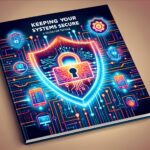In today’s digital age, computer security is more important than ever. With the increasing amount of information we store on our computers, from personal photos and documents to financial information and business data, protecting that data from cyber threats is crucial. In this article, we will discuss the importance of computer security and some key best practices for keeping your data safe.
Introduction to Computer Security
Computer security, also known as cybersecurity or IT security, is the practice of protecting computer systems and data from unauthorized access, theft, or damage. This includes securing hardware, software, networks, and information stored on digital devices. In a world where cyberattacks are becoming more sophisticated and prevalent, having strong computer security measures in place is essential for preventing data breaches and safeguarding sensitive information.
Why Computer Security Matters
The consequences of a data breach can be severe, both for individuals and businesses. Personal information such as social security numbers, credit card details, and login credentials can be stolen and used for identity theft or financial fraud. For businesses, a data breach can result in financial losses, damage to reputation, and legal penalties for failing to protect customer data.
In addition to the financial and reputational risks, computer security is also important for ensuring the continued operation of your systems. Malware, ransomware, and other forms of cyber threats can disrupt your computer systems, leading to downtime and loss of productivity.
Best Practices for Computer Security
Here are some key best practices for improving computer security and keeping your data safe:
-
Keep your software up to date: Regularly update your operating system, software, and applications to ensure they are equipped with the latest security patches and fixes.
-
Use strong, unique passwords: Avoid using easy-to-guess passwords like “123456” or “password.” Instead, use strong, unique passwords for each of your accounts and consider using a password manager to keep track of them.
-
Enable two-factor authentication: Adding an extra layer of security to your accounts with two-factor authentication can prevent unauthorized access even if your password is compromised.
-
Be cautious of phishing emails: Phishing emails are a common tactic used by cybercriminals to trick users into revealing sensitive information. Be wary of emails asking for personal information or clicking on suspicious links.
-
Backup your data regularly: In the event of a ransomware attack or hardware failure, having regular backups of your data can help you restore your files and minimize data loss.
Conclusion
Computer security is a critical aspect of protecting your data and ensuring the continued operation of your systems. By following best practices such as keeping your software up to date, using strong passwords, enabling two-factor authentication, and being cautious of phishing emails, you can significantly reduce the risk of falling victim to cyber threats. Remember, the best defense against cyberattacks is a proactive approach to computer security. Stay informed, stay vigilant, and keep your data safe.










